|
|
|
Sort Order |
|
|
|
Items / Page
|
|
|
|
|
|
|
| Srl | Item |
| 1 |
ID:
164641


|
|
|
|
|
| Summary/Abstract |
Public diplomacy (PD) lacks an agreed-upon definition and boundaries. The ambiguity surrounding the conceptualization of the term leads to confusion among scholars and practitioners and hinders the consolidation of PD as an academic field. This article surveys 160 articles and books on PD, categorizes diverse perspectives into a taxonomy, and explores the coherence of each. The taxonomy can be categorized into these perspectives: state-centric, neo-statist, nontraditional, society-centric, and accommodative. The article maps the boundaries of public diplomacy with much needed clear and coherent criteria and positions PD within the broader discipline of international relations.
|
|
|
|
|
|
|
|
|
|
|
|
|
|
|
|
| 2 |
ID:
175852
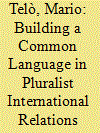

|
|
|
|
|
| Summary/Abstract |
This article aims to contribute to the gradual building of a common scientific language within the world International Relations (IR) epistemic community. The author shares the objective, indicated by many leading Chinese scholars, of a pluralist IR theory that goes beyond Western-centric mainstream theories to provide a European continental perspective. Such a perspective takes stock, on the one hand, of the legacy of Gramsci, Bobbio, and Habermas, and, on the other, of the theoretical implications of European unity as a sophisticated instance of regional cooperation. Since the dialogue must be at the highest possible theoretical level, the author selects as main partners two leading theories from the increasingly rich and internally various Chinese IR scholarship: the books recently published in English by Qin Yaqing and Yan Xuetong, who represent—not only in China, but at world level—two fundamental references in the international theoretical debate. They lead two innovative approaches: Qin’s relational theory and Yan’s theory of moral realism. The author discusses their main theses and concepts regarding IRT and global governance in a free, open, and dialectic way, notably, the balance between background cultures and multilateral convergence; and the differences between the crucial concepts of hegemony, domination, and leadership, as well as alternative perspectives on global governance within a multipolar world—a new post-hegemonic multilateralism? Or a bipolar global power structure competing for leadership?
|
|
|
|
|
|
|
|
|
|
|
|
|
|
|
|
| 3 |
ID:
141844
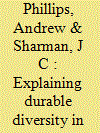

|
|
|
|
|
| Summary/Abstract |
International Relations theories generally hold that increased interaction between units in an international system produces convergence in their forms through military competition, institutional emulation, or normative socialization. In contrast, we argue that diverse international systems can endure despite increasing interaction. The early modern Indian Ocean international system hosted a variety of statist, corporate, and imperial polities. Diversity endured for three reasons. First, powerful foreign and local actors held differing maritime and land-oriented preferences for conquest, which created the potential for coexistence between unlike polities. Second, congruent European and Asian ideas of heteronomy facilitated durable polity diversity. Third, strategies of localization enhanced enmeshment. Convergence on common polity forms failed to occur despite the presence of a statist model during this period. Subsequently, a reconfigured form of diversity under colonial empires succeeded this order. Greater attention to past diverse systems coheres with recent calls to study history to better understand not only contemporary instances of international hierarchy, but also unbundled and shared sovereignty regimes.
|
|
|
|
|
|
|
|
|
|
|
|
|
|
|
|
| 4 |
ID:
155320
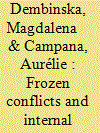

|
|
|
|
|
| Summary/Abstract |
The complex architecture of fragmented authority in the international system remains under-theorized. Understanding the world of separatist regions that turn into de facto states is high on the research agenda. While patron states are said to be a necessary condition, we argue that it might not be a sufficient one to explain the varying degrees of survival/endurance of de facto states. This analytical essay is an effort to establish directions for research that would better account for the variation among cases by integrating their internal dynamics with what we already know about the role of external factors. Adopting a political sociology perspective, this article focuses on understudied aspects of internal processes and points to the role of local elites in state and nation-building during civil wars and after violence declines. We contend that such a perspective helps to account in a more comprehensive way for the processes underlying the status quo while, at the same time, analyzing the interplay between external and internal dynamics of frozen conflicts. We show that students of de facto states would gain from employing literatures on state-building and nation-building to articulate an analytical framework that would reassess the role of local elites in building a state and a nation, and analyze the societal (un)responsiveness as well as the strategies of passive or active accommodation, resistance or opposition within de facto states' populations.
|
|
|
|
|
|
|
|
|
|
|
|
|
|
|
|
| 5 |
ID:
119230


|
|
|
|
|
| Publication |
2013.
|
| Summary/Abstract |
How and why do some foreign policy crises end successfully and efficiently, but others do not? Do democracies deal better than non-democracies with foreign policy crises? Focusing on both the outcome and the duration of foreign policy crises, this article employs event history (survival) analysis to model and test three models of foreign policy crisis derived from realist, liberal, and constructivist theories and the level-of-analysis framework. The dataset in this article is drawn from the International Crisis Behavior Project, 1918-2007. The analysis indicates that democracies are more likely to solve a foreign policy crisis successfully and efficiently than non-democracies. While the involvement of international organization during a crisis has a negative effect on a state's goal of 'winning' a crisis more quickly, the increasing power of a rival also hinders and prolongs the achievement of success in a crisis. Finally, the more violence a state uses during a crisis, the more difficult it is for this state to solve the crisis in a timely manner.
|
|
|
|
|
|
|
|
|
|
|
|
|
|
|
|
| 6 |
ID:
095754


|
|
|
| 7 |
ID:
151201
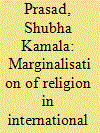

|
|
|
|
|
| Summary/Abstract |
This article aims to address why religion has been marginalised in international relations (IR) and discusses its implications. The first section examines the literature on the secular roots of the discipline of IR and how theoretical inputs from the West are shaped by context-specific European events and philosophies that are not ‘universal’ in nature. The second part delves into how the existing theoretical traditions of IR—realism, liberalism and constructivism—can incorporate religion as a variable in evaluating international politics. The final section will explore the problems with the recent spate of literature from the West after 9/11 on religion and IR. The article contends that the Indian conception of secularism, which has been studied in-depth vis-à -vis Indian domestic politics but not international politics, can be further examined to formulate frameworks that understand and deal with religion in IR.
|
|
|
|
|
|
|
|
|
|
|
|
|
|
|
|
| 8 |
ID:
120822


|
|
|
|
|
| Publication |
2013.
|
| Summary/Abstract |
While global politics simulations have great potential to produce deeper learning of international affairs and IR theories and to promote the further development of technical skills, there are a variety of simulations to choose from, each with its own advantages and disadvantages for student learning. This paper engages in a comparative analysis of five distinct simulation types to examine the ways in which structural differences grant instructors more or less control over the learning environment. The five simulation types are the following: credit- and noncredit-bearing Model United Nations activities, hybrid Model UN activities, extended-in class simulations of real global actors and problems, and extended in-class simulations of fabricated global systems. The paper then considers the distinct opportunities for content, experiential, and theoretical learning within each simulation type.
|
|
|
|
|
|
|
|
|
|
|
|
|
|
|
|
| 9 |
ID:
145065
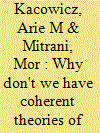

|
|
|
|
|
| Summary/Abstract |
This article offers a systematic and critical attempt to consider the question of why the discipline of international relations is at something of a loss to deal with the concept of globalization at a theoretical level. The article discusses this theoretical deficit by raising the following questions: How should we cope with globalization from an IR perspective? Why don't we have coherent theories of IR about globalization? What should we do about that? We argue that although there is a theoretical need to theorize globalization in the framework of conventional IR theories, there are serious impediments that preclude us from developing coherent IR theories about globalization, mainly due to the inherent incompatibility between the features of conventional IR theories and the concept and realities of globalization.
|
|
|
|
|
|
|
|
|
|
|
|
|
|
|
|
|
|
|
|
|